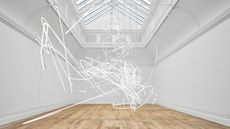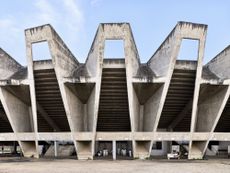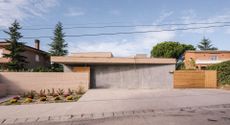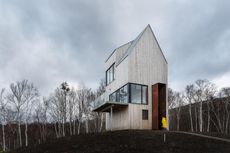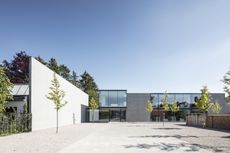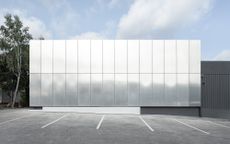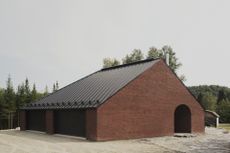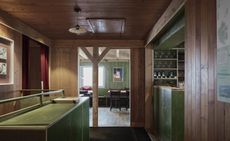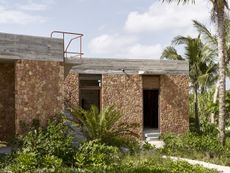Architects Directory Alumnus: Titik Dua hotel by Andra Matin
The Wallpaper* Architects Directory has turned 20. Conceived in 2000 as our index of emerging architectural talent, this annual listing of promising practices, has, over the years, spanned styles and continents; yet always championing the best and most exciting young studios and showcasing inspiring work with an emphasis on the residential realm. To mark the occasion, in the next months, we will be looking back at some of our over-500 alumni, to catch up about life and work since their participation and exclusively launch some of their latest completions. First featured in Wallpaper* in the 2007 Architects Directory, Indonesian architect Andra Matin has just completed an eye catching new hotel in Bali's Ubud, the Titik Dua.
- (opens in new tab)
- (opens in new tab)
- (opens in new tab)
- Sign up to our newsletter Newsletter
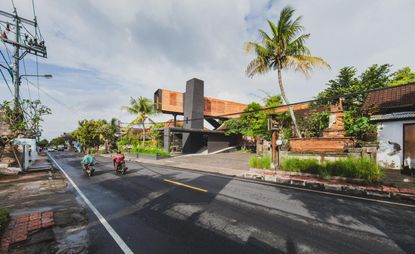
When invited to create a new hotel and cultural centre in Ubud, Bali, Indonesian architect Andra Matin soon realised that his assigned plot didn't offer direct access to the street. Set further aback, the building was to be created behind an existing gallery that was taking up the obvious place where a ‘grand entrance' would be. Yet when asked about the project's ‘main challenge', this unorthodox situation didn't quite make the cut; shifting plans that led to budgetary and timeline changes were the project's key obstacles to overcome, says the architect.
The hotel's lack of street frontage was seen more as an exciting opportunity, an architectural puzzle, solved by creating a vertical entrance, as the visitor goes up and into a 45m-long, high bridge, on the other side of which is the main Titik Dua complex. ‘The bridge connecting the main road to the site creates a special experience to welcome the guests and at the same time establishes a visual connection with the surroundings,' says Matin.
Located in Bali's centre, in the town of Ubud, Titik Dua comprises several functions; conceived as a creative hub and hospitality hybrid, where the arts, film, architecture, graphic design and music can find a home on the ground floor, and hotel guests can stay in rooms on the upper level, the project combines the private and the public. There's also an amphitheatre, a multi-functional room, and a bar, as well as a restaurant right under the scheme's pitched roof – ‘a space often unused in many Balinese buildings,' says Matin.

Originally intended to be created in reused shipping containers, the project now features natural brick and a timber roof in forms that blend modernity and the traditional Indonesian vernaculars. Steel was also used to ‘add a modern palette', but at its heart, the architecture was designed so that guests can enjoy the island's pleasant climate, merging inside and outside, and allowing the breeze to go through and cool down the interiors naturally where possible.
‘The boxy look of the building echoes the original plan, which was to reuse shipping containers to construct the whole structure,' explains Matin. ‘The bricks are arranged in a wavy configuration in some areas of the hotel, mimicking the façade of a container, with details that allow for air circulation and natural sunlight.'
Since 2007, when Matin and his firm were featured as a relatively young, emerging practice in the Wallpaper* Architects Directory, things have changed for the Bandung-based office, whose reputation has been reaching far beyond its country's borders. Recent accolades include an honourable mention at the 2018 Venice Architecture Biennale and a shortlisting for the prestigious Aga Khan awards in 2019.
‘We’ve slowly grown from an office of about twelve people in 2007 to one of more than forty,' says the architect. ‘At the same time, we try to be consistent in exploring our architecture which is based on context, climate, user, space and material.' Work has grown in scale too, with airports, preservation work and sports complexes now featuring in the practice's portfolio. Yet housing remains a typology close to Matin's heart. ‘Residential was the first typology that we started out designing, so coming back to residential projects is always interesting for me,' he adds.
MORE FROM WALLPAPER* ARCHITECTS DIRECTORY 2020





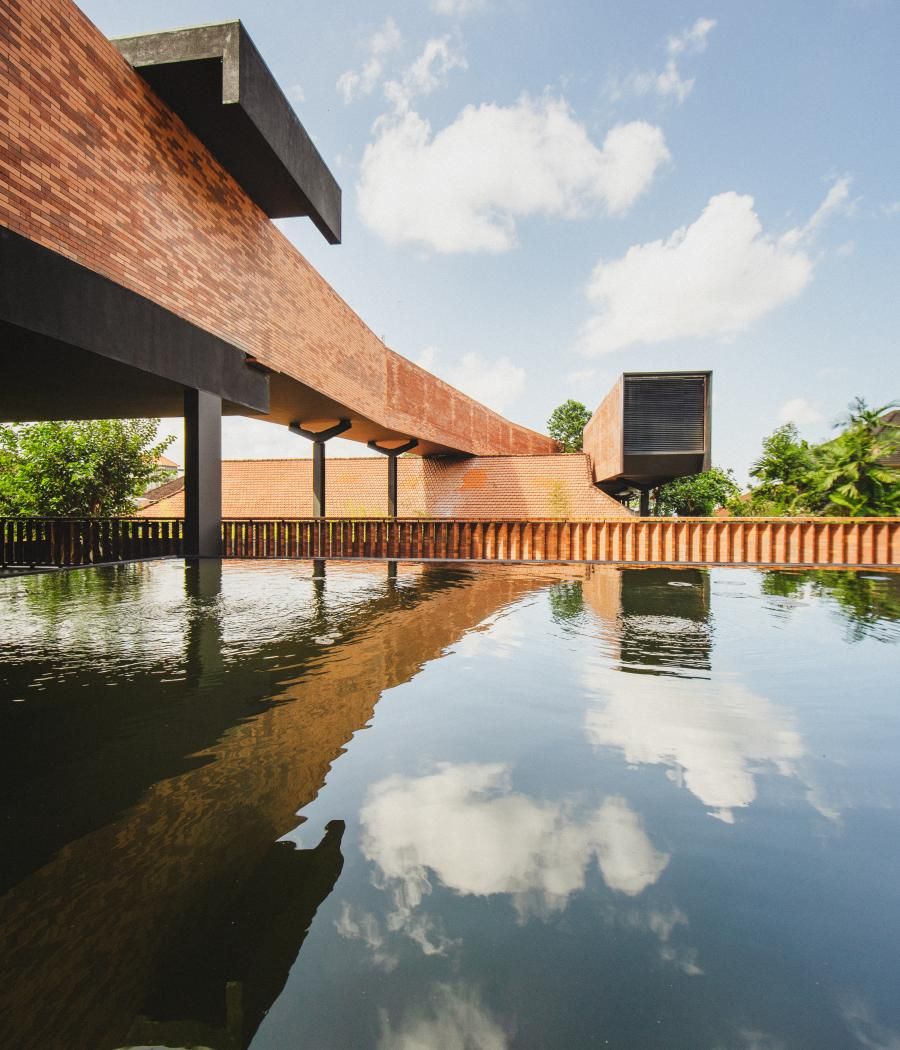





INFORMATION
andramatin.com (opens in new tab)
Ellie Stathaki is the Architecture Editor at Wallpaper*. She trained as an architect at the Aristotle University of Thessaloniki in Greece and studied architectural history at the Bartlett in London. Now an established journalist, she has been a member of the Wallpaper* team since 2006, visiting buildings across the globe and interviewing leading architects such as Tadao Ando and Rem Koolhaas. Ellie has also taken part in judging panels, moderated events, curated shows and contributed in books, such as The Contemporary House (Thames & Hudson, 2018) and Glenn Sestig Architecture Diary (2020).
-
 Cerith Wyn Evans: ‘I love nothing more than neon in direct sunlight. It’s heartbreakingly beautiful’
Cerith Wyn Evans: ‘I love nothing more than neon in direct sunlight. It’s heartbreakingly beautiful’Cerith Wyn Evans reflects on his largest show in the UK to date, at Mostyn, Wales – a multisensory, neon-charged fantasia of mind, body and language
By Harriet Lloyd-Smith • Published
-
 Nifemi Marcus-Bello is the Nigerian designer shaping Africa’s designscape
Nifemi Marcus-Bello is the Nigerian designer shaping Africa’s designscapeAmong Wallpaper’s ‘Future Icons’, Lagos-based designer Nifemi Marcus-Bello speaks of creating a local manufacturing network and documenting design production in Africa
By Ugonna-Ora Owoh • Published
-
 Luxury loungewear brands to hibernate in this winter
Luxury loungewear brands to hibernate in this winterAs days get shorter and temperatures drop, we present the best loungewear for luxuriating in this autumn and winter, from brands including Loro Piana, Raey, Extreme Cashmere and more
By Tilly Macalister-Smith • Published
-
 MoMA celebrates South Asian architecture in the postcolonial era
MoMA celebrates South Asian architecture in the postcolonial eraThe Museum of Modern Art’s latest exhibition, ‘The Project for Independence: Architectures of Decolonization in South Asia 1947 – 1985’, takes us through the aspirations, innovations and visions of South Asian countries after the end of colonial rule in the region
By Pei-Ru Keh • Last updated
-
 Architects Directory 2020: Malu de Miguel, Spain
Architects Directory 2020: Malu de Miguel, SpainSet up in Madrid only three years ago, Malu de Miguel’s practice may be young, but the dynamic Spanish architect is a master at creating well proportioned, tactile residences, using humble materials and plenty of natural light. Her portfolio includes a house in Menorca and a family home in Madrid suburb Boadilla del Monte. The latter combines brick, concrete, large openings, light wells and airy double height spaces in a modest home with a sense of spatial luxury that punches above its weight.
By Simon Mills • Last updated
-
 Celebrating 10 years of exquisite residential architecture with Omar Gandhi
Celebrating 10 years of exquisite residential architecture with Omar GandhiThe Wallpaper* Architects Directory has turned 20. Conceived in 2000 as our index of emerging architectural talent, this annual listing of promising practices, has, over the years, spanned styles and continents; yet always championing the best and most exciting young studios and showcasing inspiring work with an emphasis on the residential realm. To mark the occasion, this summer, we’re looking back at some of our over-500 alumni, to catch up about life and work since their participation and exclusively launch some of their latest completions. 2014 Architects Directory alumnus, Canada-based Omar Gandhi celebrates ten years of practice with a monograph. Entitled Adaptation, the book explores the architect's journey from the foundation of his studio to the present day through a number of exquisite residential designs.
By Ellie Stathaki • Last updated
-
 Architects Directory Alumni: Notary office by Govaert & Vanhoutte
Architects Directory Alumni: Notary office by Govaert & VanhoutteThe Wallpaper* Architects Directory has turned 20. Conceived in 2000 as our index of emerging architectural talent, this annual listing of promising practices, has, over the years, spanned styles and continents; yet always championing the best and most exciting young studios and showcasing inspiring work with an emphasis on the residential realm. To mark the occasion, this summer, we're looking back at some of our over-500 alumni, to catch up about life and work since their participation and exclusively launch some of their latest completions. This new office building in Belgium's Bruges is the work of 2007 Architects Directory alumnus Govaert & Vanhoutte, as well as a balanced, minimalist, glass and concrete composition of cool and warm, light and dark.
By Ellie Stathaki • Last updated
-
 Architects Directory Alumni: Fabric Warehouse 2.0 by Fearon Hay
Architects Directory Alumni: Fabric Warehouse 2.0 by Fearon HayThe Wallpaper* Architects Directory has turned 20. Conceived in 2000 as our index of emerging architectural talent, this annual listing of promising practices, has, over the years, spanned styles and continents; yet always championing the best and most exciting young studios and showcasing inspiring work with an emphasis on the residential realm. To mark the occasion, this summer, we're looking back at some of our over-500 alumni, to catch up about life and work since their participation and exclusively launch some of their latest completions. Award winning New Zealand architecture studio Fearon Hay, which featured in the 2001 Wallpaper* Architects Directory, has created Fabric Warehouse 2.0, an industrial building with bold, art installation-like features.
By Jonathan Bell • Last updated
-
 Architects Directory 2020: Atelier Barda, Canada
Architects Directory 2020: Atelier Barda, CanadaBoth graduates from the École Nationale Supérieure d’Architecture de Toulouse in France, Cécile Combelle and Antonio Di Bacco joined forces to set up Atelier Barda in Montreal in 2013. Their work spans all scales and typologies, from new-build architecture to furniture design (through their product division, Foraine), always rooted in a personal approach, intuitive design and rigorously researched solutions. Maison Gauthier in Canada’s Mont-Tremblant displays their minimalist aesthetic and attention to detail.
By Ellie Stathaki • Last updated
-
 Architects Directory Alumni: Wachthuus by Jonathan Tuckey Design
Architects Directory Alumni: Wachthuus by Jonathan Tuckey DesignThe Wallpaper* Architects Directory has turned 20. Conceived in 2000 as our index of emerging architectural talent, this annual listing of promising practices, has, over the years, spanned styles and continents; yet always championing the best and most exciting young studios and showcasing inspiring work with an emphasis on the residential realm. To mark the occasion, this summer, we're looking back at some of our over-500 alumni, to catch up about life and work since their participation and exclusively launch some of their latest completions. The Wachtuus Mountain restaurant, set in the Andermatt area's mountains, is a transformed military hut with a concealed ‘entrance to a network of tunnels’ says its creator, London based architectural designer and Wallpaper* Architects Directory alumnus Jonathan Tuckey.
By Jonathan Bell • Last updated
-
 Architects Directory 2020: Case Design, India
Architects Directory 2020: Case Design, IndiaSam Barclay moved to Mumbai in 2006, working with Studio Mumbai before setting up Case Design with his wife Erica as a partner, in 2013. Now he has projects in India, Europe, the Middle East and Africa, and has also launched Casegoods, a collection of furniture, lights and objects. ‘We aspire to create things that are simple, beautiful and functional,’ he says. The Kizikula Guest Houses in Zanzibar use the coral limestone of the island.
By Ellie Stathaki • Last updated
